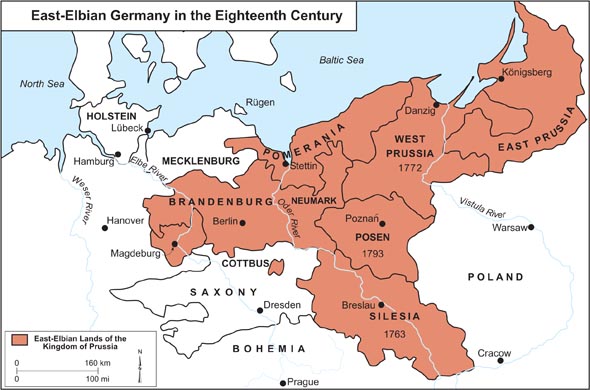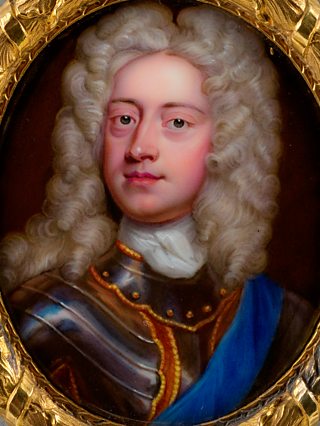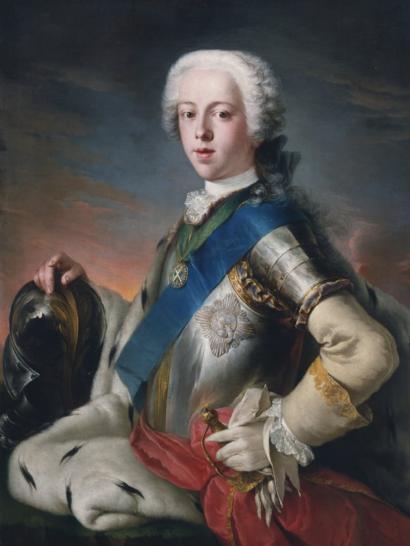A blow to the political and military strength of France and Austria, a partial Prussian reclamation of power and a significant step by Britain towards Empire.
However how did this all come about?
The Austrians never forgave the Prussians for their takeover of the mineral rich region of Silesia following the War of the Austrian Succession. In 1756 France and Austria signed the First Treaty of Versailles. The two agreed to join forces to fend off an attack by either Great Britain or Prussia. Hostility between Great Britain and France had already erupted in North America in 1754
Weary of growing French and Prussian designs on his German territory in Hanover King George II of Great Britain formed the Anglo-Prussian Alliance of 1756. The intention was to curtail French ambitions and create a wedge between France and Prussia.

Consequences of the Diplomatic Revolution (re-shaping of alliances). source: ThoughtCo.com is the World's Largest Education Resource
Hostilities between Prussia and Austria festered. The Prussian king Frederick II made the first move in Europe attacking Saxony in August 1756. His troops moved onward taking Dresden, Leipzig and Bohemia. Russia responded by allying herself with France and Austria.
Europe was now polarized into two camps that through the Diplomatic Revolution, had effectively reversed the old alliances of the War of the Austrian Succession. On one side now was the grouping of Great Britain, Prussia, Hanover and Portugal (Great Britain’s traditional ally) opposing them was France, Austria, Russia, the Spanish Empire and Sweden (France’s traditional ally). Each had minor partners as well

Battle scene from the Seven Years War source: history.com
Prussian success continued with victories at Rossbach and Leuthen (both in 1757) but the Russian-Austrian alliance retaliated and briefly occupied Berlin before the Prussian capital was relieved. An Austrian-Russian victory over the Prussians at Kunersdorf (1759) should have been a turning point but the former were unable to exploit their win. Overall the Prussian forces appeared to have the upper hand as the war dragged on and this was reaffirmed in 1762 when the Russians withdrew from the fight.
The European side of the conflict ended in 1763 with the signing of the Treaty of Hubertusburg. Archduke Joseph of Austria was confirmed as the Holy Roman Emperor with Prussian control of both Silesia and Glatz formalized. Although the Prussians had some success on the continent there were no real decisive winners on the European continent itself. Austria did face bankruptcy but Prussia failed to expand to the degree that she had hoped.
However the Seven Years War had more than one theatre of action. In North America the War was known as the French and Indian War. As already mentioned the conflict between the English and French had been underway since 1754, with the British government under William Pitt making it his priority to target France’s colonial possessions. The French intended to retaliate with an invasion of Great Britain but their naval forces were defeating at the Battle of Quiberon Bay in 1759. The victory gave the British control over Atlantic which meant that Pitt’s ambition in North America could be well supported by troop reinforcements.
The pivotal Battle of the Plains of Abraham, that cost the lives of both the British general James Wolfe and his opposing counterpart Louis Montcalm, resulted in another decisive British victory (who were allied with the Iroquois Confederation) and the eventual occupation of France’s prize North American territory in Quebec. The French and their Indian allies hit back at the Battle of Sainte-Foy but failed to retake Quebec City.

Death of General James Wolfe on the Plains of Abraham (key event in Canadian history) source: Legion Magazine
1759 was somewhat of an Annus Mirablis (a year of wonders) for Great Britain. British forces seized Fort Louis on the Senegal River in Africa and also took control of the rich island of Guadeloupe in the West Indies.
The Royal Navy enjoyed further success in the Indian Ocean that in turn would help strengthen the British hand in India. In 1757 troops led by Robert Clive aka Clive of India representing the interests of the British East India Company (an agent of Empire so to speak) would defeat the Bengals and their French Allies at the Battle of Plassey. This would prove to be a key milestone for the consolidation of British influence in the sub-continent.

Robert Clive source: Indian Express
So in a sense the Seven Years War was an early world war even more so than the Wars of the Spanish and Austrian Successions. The Treaty of Paris (1763) brought the war between Britain, and France/Spain to an end. The British were the resounding victors on the global front. They returned the Cuban city of Havana to Spain (it was captured during the war) but received Florida in return. France had to compensate Spain and did so by handing over Louisiana. All French lands East of the Mississippi in North America (not including New Orleans) were now under British control.
One could certainly make the case that the British Empire was unofficially born in 1763.
However how did this all come about?
The Austrians never forgave the Prussians for their takeover of the mineral rich region of Silesia following the War of the Austrian Succession. In 1756 France and Austria signed the First Treaty of Versailles. The two agreed to join forces to fend off an attack by either Great Britain or Prussia. Hostility between Great Britain and France had already erupted in North America in 1754
Weary of growing French and Prussian designs on his German territory in Hanover King George II of Great Britain formed the Anglo-Prussian Alliance of 1756. The intention was to curtail French ambitions and create a wedge between France and Prussia.
Consequences of the Diplomatic Revolution (re-shaping of alliances). source: ThoughtCo.com is the World's Largest Education Resource
Hostilities between Prussia and Austria festered. The Prussian king Frederick II made the first move in Europe attacking Saxony in August 1756. His troops moved onward taking Dresden, Leipzig and Bohemia. Russia responded by allying herself with France and Austria.
Europe was now polarized into two camps that through the Diplomatic Revolution, had effectively reversed the old alliances of the War of the Austrian Succession. On one side now was the grouping of Great Britain, Prussia, Hanover and Portugal (Great Britain’s traditional ally) opposing them was France, Austria, Russia, the Spanish Empire and Sweden (France’s traditional ally). Each had minor partners as well
Battle scene from the Seven Years War source: history.com
Prussian success continued with victories at Rossbach and Leuthen (both in 1757) but the Russian-Austrian alliance retaliated and briefly occupied Berlin before the Prussian capital was relieved. An Austrian-Russian victory over the Prussians at Kunersdorf (1759) should have been a turning point but the former were unable to exploit their win. Overall the Prussian forces appeared to have the upper hand as the war dragged on and this was reaffirmed in 1762 when the Russians withdrew from the fight.
The European side of the conflict ended in 1763 with the signing of the Treaty of Hubertusburg. Archduke Joseph of Austria was confirmed as the Holy Roman Emperor with Prussian control of both Silesia and Glatz formalized. Although the Prussians had some success on the continent there were no real decisive winners on the European continent itself. Austria did face bankruptcy but Prussia failed to expand to the degree that she had hoped.
However the Seven Years War had more than one theatre of action. In North America the War was known as the French and Indian War. As already mentioned the conflict between the English and French had been underway since 1754, with the British government under William Pitt making it his priority to target France’s colonial possessions. The French intended to retaliate with an invasion of Great Britain but their naval forces were defeating at the Battle of Quiberon Bay in 1759. The victory gave the British control over Atlantic which meant that Pitt’s ambition in North America could be well supported by troop reinforcements.
The pivotal Battle of the Plains of Abraham, that cost the lives of both the British general James Wolfe and his opposing counterpart Louis Montcalm, resulted in another decisive British victory (who were allied with the Iroquois Confederation) and the eventual occupation of France’s prize North American territory in Quebec. The French and their Indian allies hit back at the Battle of Sainte-Foy but failed to retake Quebec City.
Death of General James Wolfe on the Plains of Abraham (key event in Canadian history) source: Legion Magazine
1759 was somewhat of an Annus Mirablis (a year of wonders) for Great Britain. British forces seized Fort Louis on the Senegal River in Africa and also took control of the rich island of Guadeloupe in the West Indies.
The Royal Navy enjoyed further success in the Indian Ocean that in turn would help strengthen the British hand in India. In 1757 troops led by Robert Clive aka Clive of India representing the interests of the British East India Company (an agent of Empire so to speak) would defeat the Bengals and their French Allies at the Battle of Plassey. This would prove to be a key milestone for the consolidation of British influence in the sub-continent.
Robert Clive source: Indian Express
So in a sense the Seven Years War was an early world war even more so than the Wars of the Spanish and Austrian Successions. The Treaty of Paris (1763) brought the war between Britain, and France/Spain to an end. The British were the resounding victors on the global front. They returned the Cuban city of Havana to Spain (it was captured during the war) but received Florida in return. France had to compensate Spain and did so by handing over Louisiana. All French lands East of the Mississippi in North America (not including New Orleans) were now under British control.
One could certainly make the case that the British Empire was unofficially born in 1763.


